Roosevelt in Africa est un film américain de genre Biographie
Roosevelt in Africa (1910)
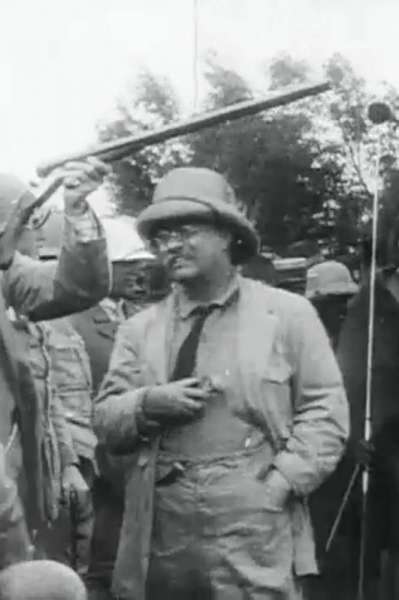
Si vous aimez ce film, faites-le savoir !
- Infos
- Casting
- Infos techniques
- Photos
- Vidéos
- Passages TV
- Citations
- Personnages
- Musique
- Récompenses
OrigineEtats-Unis
Themes Documentaire historique, Documentaire sur une personnalité, Documentaire sur la politique, Politique
Note59%










Roosevelt in Africa is a film by Cherry Kearton, released in 1910. It is a documentary featuring Theodore Roosevelt in Africa. It is shot in silent black and white.
One of the biggest headline-grabbing stories of 1910 was former president Theodore Roosevelt's safari into Africa. Landing in Mombasa in 1909, Roosevelt spent months in the wilds of East Africa, hunting big game in parts of what are now Kenya and Uganda.
For some of this journey, he was accompanied by famed British bird-and-animal photographer Cherry Kearton, who shot wildlife and native scenes with a hand-cranked motion picture camera. Among the scenes captured by Kearton's camera were a number of Kikuyu and Maasai gatherings and dances – although the Maasai were incorrectly identified in the film's slates as "Zulus."
Quick to cash in on the media frenzy, the Selig company of Chicago, actually released a fake documentary which it had shot at its own California game preserve, using a lookalike actor as a stand-in for Roosevelt when necessary.
Motion Picture Patents Company, using Pathe as its distribution arm, responded by releasing the authentic Kearton footage under the title Roosevent in Africa.
Kearton had dreamed of filming an African lion, but was unable to do so during the Roosevelt voyage. The fake Selig film did feature a lion – a tamed aged lion.
Commentaires
Postez un commentaire :
Suggestions de films similaires à Roosevelt in Africa
Il y a 10888 ayant les mêmes genres cinématographiques (dont 196 ayant exactement les mêmes 2 genres que Roosevelt in Africa), 10065 films qui ont les mêmes thèmes (dont 217 films qui ont les mêmes 4 thèmes que Roosevelt in Africa), pour avoir au final 70 suggestions de films similaires.Si vous avez aimé Roosevelt in Africa, vous aimerez sûrement les films similaires suivants :

Crawford (2008)
Origine Etats-Unis
Genres Biographie, Documentaire
Thèmes Documentaire historique, Documentaire sur une personnalité, Documentaire sur la politique, Politique
Note67%





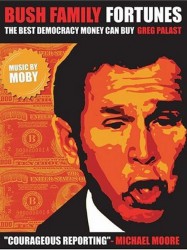 , 1h2
, 1h2Réalisé par Gregory Allyn Palast
Origine Etats-Unis
Genres Biographie, Documentaire
Thèmes Les attentats du 11 septembre 2001, Religion, Le terrorisme, Transport, Aviation, Documentaire sur le droit, Documentaire sur la guerre, Documentaire historique, Documentaire sur une personnalité, Documentaire sur la politique, Documentaire sur la religion, Documentaire sur les technologies, Documentaire sur le terrorisme, Politique, Religion musulmane, Film catastrophe, Film de catastrophe aérienne, Détournement d'avion
Note67%





The film starts with a brief pre-title clip from presenter Greg Palast’s aborted interview with Florida Director of Elections Clayton Roberts, who walks out.

Salvador Allende (2004)
, 1h40Réalisé par Patricio Guzmán
Origine Chili
Genres Biographie, Documentaire
Thèmes Politique, Documentaire historique, Documentaire sur une personnalité, Documentaire sur la politique, Politique, Les dictatures latino-américaines
Acteurs Patricio Guzmán
Note75%





En 1970, Salvador Allende Gossens est élu à la présidence du Chili. Il représente un espoir. Le film montre cet espoir et l'acharnement d'Allende à conquérir les cœurs des chiliens. Il montre l'implication de Richard Nixon dans le coup d'État et le rôle de la CIA...

Horns and Halos (2002)
, 1h30Réalisé par Michael Galinsky
Origine Etats-Unis
Genres Drame, Biographie, Documentaire
Thèmes Film sur un écrivain, Documentaire historique, Documentaire sur une personnalité, Documentaire sur la politique, Politique
Note70%





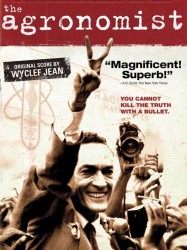
L'Agronome (2004)
, 1h30Réalisé par Jonathan Demme
Origine Etats-Unis
Genres Biographie, Documentaire
Thèmes La mer, Transport, Documentaire historique, Documentaire sur une personnalité, Documentaire sur la politique, Politique
Acteurs Ronald Reagan
Note73%





Le journaliste Jean Dominique, militant avec sa femme Michèle Montas pour une information accessible par Radio Haïti-Inter en Haïti, relate différents épisodes de sa lutte. Le récit direct et honnête qu’il fait, à partir de 1986 à son ami Jonathan Demme et le tournage dans le pays, montrent toute la sympathie et la solidarité que réserve le peuple haïtien à ceux qui prennent réellement son parti, en même temps que le caractère périlleux de la promotion de l’information libre dans le pays. Combattant et exilé, celui qui se faisait appeler l’agronome, en fonction de sa formation de base, n’a jamais interrompu sa lutte jusqu’à son assassinat en 2000.
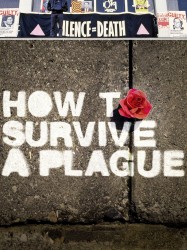
How to Survive a Plague (2012)
, 1h49Origine Etats-Unis
Genres Biographie, Documentaire, Historique
Thèmes Maladie, Sexualité, Homosexualité, Documentaire historique, Documentaire sur l'homosexualité, Documentaire sur la politique, Documentaire sur la santé, Politique, LGBT, Sida, LGBT
Acteurs Larry Kramer
Note75%





Le film traite des premières années de l'épidémie du SIDA, et des efforts d'Act up et de Treatment Action Group .
 , 55minutes
, 55minutesGenres Biographie, Documentaire
Thèmes Le racisme, Religion, Documentaire sur la discrimination, Documentaire sur le droit, Documentaire sur la guerre, Documentaire historique, Documentaire sur une personnalité, Documentaire sur la religion, Politique, Religion juive, Documentaire sur la Seconde Guerre mondiale
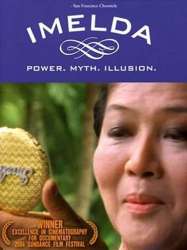
Imelda (2003)
, 1h43Origine Philippines
Genres Biographie, Documentaire
Thèmes Documentaire sur une personnalité, Documentaire sur la politique, Politique
Note74%





Diaz followed Imelda Marcos, the former First Lady of the Philippines, for a month and interviewed her daughter Imee and her son Ferdinand, Jr. The film incorporates third party interviews and archive material; it recounts Imelda's life, including her marriage to her husband, Philippine president Ferdinand Marcos. Discussing the Marcos presidency, Imelda says that there were no human rights abuses in her country; she says that her husband abolished Congress and declared martial law in 1972 to protect democracy. She says that she took 3,000 pairs of shoes with her when she went into exile, and justifies her extravagant clothing by saying that it "inspired the poor to dress better". She also says that she had enormous museums and theaters constructed to enrich the lives of Filipinos.
 , 4h30
, 4h30Genres Drame, Guerre, Biographie, Documentaire, Historique
Thèmes Documentaire sur la guerre, Documentaire historique, Documentaire sur la politique, Politique, Documentaire sur la Seconde Guerre mondiale
Acteurs Sebastien Koch, Tobias Moretti, Dagmar Manzel, André Hennicke, Michael Gwisdek, Wilfried Hochholdinger
Note74%





Une réévaluation du rôle joué par Albert Speer dans le Troisième Reich. Speer, qui a finalement été condamné aux procès de Nuremberg et a purgé une peine de 20 ans de prison, était connu pour avoir conçu de nombreux bâtiments du Troisième Reich et pour avoir été le ministre de la production de guerre d'Hitler.
 , 1h31
, 1h31Origine Bresil
Genres Drame, Biographie, Documentaire, Musical
Thèmes La musique, Documentaire sur la guerre, Documentaire historique, Documentaire sur la musique, Documentaire sur une personnalité, Politique, Documentaire sur la Seconde Guerre mondiale
Acteurs Alice Faye, Aurora Miranda, Carmen Miranda, Aloísio de Oliveira, Rita Moreno, Cesar Romero
Note75%





Documentaire sur la chanteuse, danseuse et actrice, Carmen Miranda, la « Bombe brésilienne », composé d'images inédites de l'un de ses films perdus Banana-da-Terra et d'images de son enterrement. Un portrait de Carmen Miranda à travers des images d'archives et des interviews.
 Connexion
Connexion